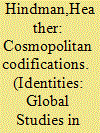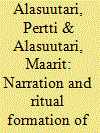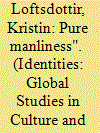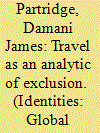|
|
|
Sort Order |
|
|
|
Items / Page
|
|
|
|
|
|
|
| Srl | Item |
| 1 |
ID:
089202


|
|
|
|
|
| Publication |
2009.
|
| Summary/Abstract |
Globalization has been the site of many renegotiations of identity, both at the supra- and subnational levels. Yet, there is an interstitial zone of communication between the global and the local in which distinct processes of boundary-making and translation take place. This essay examines mediators of internationalization, elite nationals and expatriate employees, as they negotiate the form that difference can take in the global marketplace. The contentious politics of Nepalese nationalism as well as South Asian colonial delineations of difference provide precedents for the current social practices of a cosmopolitan population that establishes a hierarchy of difference while also excusing themselves from demarcation and restricting the purview of the concept of culture. The result is a zone made safe for the operation of neoliberal business (a practice seen to be without history or geography) with alterity only allowed in narrowly commodifiable settings.
|
|
|
|
|
|
|
|
|
|
|
|
|
|
|
|
| 2 |
ID:
089213


|
|
|
|
|
| Publication |
2009.
|
| Summary/Abstract |
The violent attacks on African immigrants and refugees in marginal settlements surrounding South Africa's largest cities in May 2008 occasioned a rush of mostly well-intentioned attempts by journalists, public intellectuals, and government officials to discover the causes and find the cures for the outbreak. This article interrogates the glosses of "xenophobia" and "social deprivation" that were all too quickly applied to explain the attacks in public representations of this sorry episode in South Africa's post-apartheid history. The account of the focal events is based on a thorough sifting of press reports; victims', perpetrators', and police testimonies; government and civil society spokespersons' interventions; and field research. Rather than providing a monovocal, hierarchical argument for one or another analysis emerging from the reportage, this article juxtaposes complex and conflicting local accounts, justifications, forces, and circumstances to provide an intriguing if ultimately at this early stage irresolvable image of these tragic events. The implications for South African social identities, institutions, and democratic order, however, are at the end all too clearly illuminated.
|
|
|
|
|
|
|
|
|
|
|
|
|
|
|
|
| 3 |
ID:
089209


|
|
|
|
|
| Publication |
2009.
|
| Summary/Abstract |
The article is based on a case study of second generation Karelian migrants, whose parents had to move to other parts of Finland from the region of Karelia that was ceded to the Soviet Union at the end of World War II. The article poses the question, how long-lived diasporic identities are, and what are the conditions that affect assimilation or maintenance of a diasporic identity. In the Karelian migrants' case, already the first generation was quite successful in integrating with the rest of the Finnish society, and with the second generation, the integration has been practically complete, largely because of a short cultural distance between the evacuees and other Finns. A recent resurgence of interest in their roots by Karelian evacuees or their family members is primarily due to end of the Cold War and the possibility to freely and openly visit Karelia. Visiting Karelia has a ritual-like function for them. To that concrete, bodily experience of going there they can attach the abstract idea that in some ways they are Karelians and thus strengthen the emotional attachment to their roots. In that sense, visiting Karelia can also be described as a pilgrimage.
|
|
|
|
|
|
|
|
|
|
|
|
|
|
|
|
| 4 |
ID:
089204


|
|
|
|
|
| Publication |
2009.
|
| Summary/Abstract |
Iceland did not participate directly in the nineteenth century colonial project, but the interwoven racial, gendered, and nationalistic ideologies associated with the colonial project were very much a part of Icelandic identity as shaped by nationalist and imperialist discourses in Europe. This article focuses on representations of Africa in nineteenth century Iceland, claiming that the Icelandic discussions of Africa were not so much concerned with the continent itself, but through descriptions of the exploration and colonization of Africa, European masculinities were affirmed and Icelanders "natural" location within that category. This was particularly important at times when Iceland was seeking independence and acceptance as a "white" European country. I stress these nineteenth century texts as gendered testimonies that show the interaction of various poles of identity, being written by white, Icelandic men and originating from a marginal country within Europe.
|
|
|
|
|
|
|
|
|
|
|
|
|
|
|
|
| 5 |
ID:
089210


|
|
|
|
|
| Publication |
2009.
|
| Summary/Abstract |
This article examines the ways in which travel serves as an analytic to understand citizenship and the production of noncitizens after the Berlin Wall. This production is linked to a shift in the post-Wall German and European discourses and practices of asylum, which are significantly renegotiated and restricted shortly after the Wall falls. It is not only the law that changes, but also the mobility of the subjects perceived not to belong. The production of non-citizens is also related to official and unofficial articulations that attach Germanness to "Whiteness." "Black" subjects must not only negotiate their citizenship via real histories of mobility and displacement but also because their skin itself signifies travel and adventure. In the end, I write about the space that this imagination of travel and adventure through "Black" bodies both opens up and closes off for a politics based on "Blackness." I turn from normative accounts to the voices and bodies of "Black" subjects themselves.
|
|
|
|
|
|
|
|
|
|
|
|
|
|
|
|
| 6 |
ID:
089206


|
|
|
|
|
| Publication |
2009.
|
| Summary/Abstract |
This article explores the representation of victimhood in political discourse and the relation between victimhood, identity, and political agency. The empirical material is drawn from the early days of the Northern Ireland conflict and covers the debate on internment that was in operation from August 1971 until December 1975. Both those supporting and those opposing internment drew on images of victimhood-images that were vital in the construction of legitimacy and political agency. First, the rendering of detailed stories of individual suffering and victimhood produced compassion and empathy-features legitimising the different approaches. Second, the construction of victimhood involved mechanisms of inclusion and exclusion, creating "we-them" dichotomies, producing "collectives of victimhood," which in many cases worked as a platform from which political agency could be voiced. And third, the construction of victimhood produced political truths. The victim was given a particular status embodying a particular moral integrity to determine the truths about "what had really happened," a status that made the victim a vital agent in the political battle for "the hearts and minds." The article stresses the importance of studying the representation of victimhood within particular historical contexts and demonstrates the complex and ambiguous effects of the representations of victimhood in violent political conflicts. The examination shows that victimhood has both humanising and dehumanising effects and, depending on the contextual framework, victimhood can create confidence, empowerment, and agency, but also disempowerment and passivity.
|
|
|
|
|
|
|
|
|
|
|
|
|
|
|
|
|
|
|
|
|